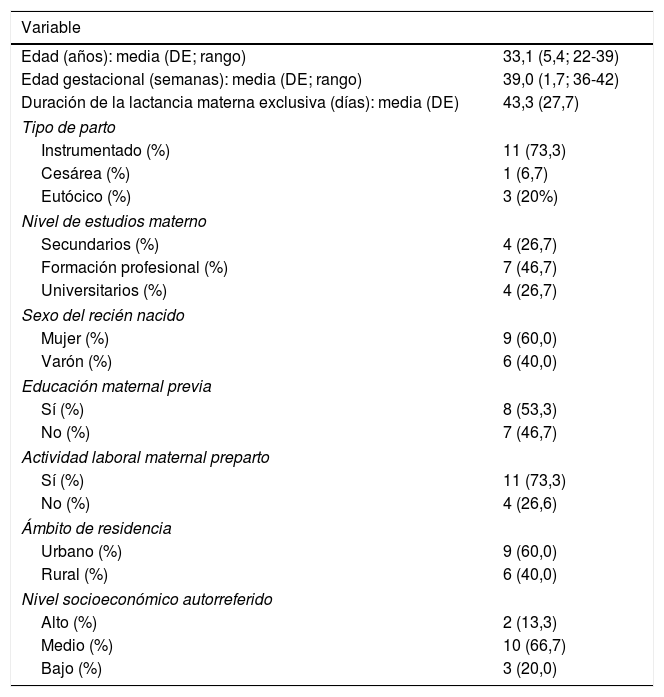Conocer la experiencia personal y sentimientos de las mujeres primíparas que se vieron obligadas a abandonar la lactancia materna (LM) antes del tiempo previsto inicialmente por cada mujer, así como las causas del abandono y el papel de los profesionales sanitarios.
MétodoEstudio cualitativo fenomenológico mediante entrevista semiestructurada. Se realizó un muestreo opinático mediante informadores clave, hasta alcanzar la saturación de la información. Se realizó análisis de contenido cualitativo para generar códigos y asignar categorías.
ResultadosSe entrevistaron 15 mujeres de 33,1 (DE 5,4) años. Se constató ambivalencia de sentimientos, considerando que la LM es una experiencia satisfactoria a la par que sacrificada y dolorosa. Las mujeres referían escasez de conocimientos. La inseguridad sobre la alimentación y el dolor físico fueron las causas más importantes para el abandono. Se evidenció además una dualidad de sentimientos entre la tranquilidad que supone la alimentación artificial, al saber que el niño está bien alimentado, y la sensación de culpabilidad por no haber mantenido la LM.
Consideraron que los profesionales no realizan adecuadamente su labor de promoción de la LM, refiriendo numerosas ocasiones en las que los propios profesionales sanitarios efectuaron prácticas contrarias a su instauración y mantenimiento.
ConclusionesEn el relato de las madres se constatan necesidades formativas y de soporte emocional insuficientemente cubiertas. Las enfermeras implicadas en la atención de estas mujeres deberían explorar sistemáticamente dichas necesidades.
The aim of this study was to discover the personal experience and feelings of primiparous women who had to abandon breastfeeding (BF) before the expected time, as well as the causes of abandonment and the role of health professionals.
MethodA qualitative study through semi-structured interview was carried out. A purposive sampling by key informants was conducted, until saturation of the information was reached. Qualitative content analysis was carried out to generate codes and assign categories.
ResultsWe interviewed 15 women aged 33.1 (SD 5.4) years. Ambivalent feelings were found, while BF was considered a satisfying experience, it was also sacrificial and painful. They refer to a lack of knowledge, and insecurity about nourishing their infant and physical pain seem to be the most important reasons for giving up. There is also a duality of feelings between the peace of mind afforded by artificial feeding, knowing that their child is well nourished, and the feeling of guilt for not having maintained BF.
They believe that professionals do not adequately perform their work to promote BF, referring to numerous occasions when health professionals themselves have performed practices contrary to its establishment and maintenance.
ConclusionsIn the mothers’ account, emotional training and emotional support needs are insufficiently covered. Nursing professionals involved in the care of these women should systematically explore these needs.
Artículo
Comprando el artículo el PDF del mismo podrá ser descargado
Precio 19,34 €
Comprar ahora








